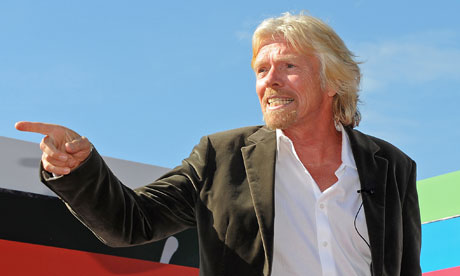The sprawling business empire that makes up Richard Branson's Virgin investment group consists of about 400 operations, a tangled web of enterprises owned via a complicated series of offshore trusts and overseas holding companies.
Branson's finances are difficult to penetrate because of their complexity and opaqueness, with few of his large companies wholly owned by Branson himself. His big-branded firms such as Virgin Atlantic, Virgin Money, Virgin Media and Virgin Trains have other major shareholders. In some cases, he simply licenses the brand to a company that has purchased a subsidiary from him, and these include Virgin Mobile USA, Virgin Mobile Australia, Virgin Radio and Virgin Music (now part of EMI). In return, as the licence holder of the Virgin brand, he receives annual or triennial fees that can amount to hundreds of millions over time.
By forging partnerships with cash-rich allies, Branson has established new businesses without depleting the group's reserves and spending little to establish new ventures in sectors such as mobile telecoms. But initiatives come straight from Branson, who prides himself on his ability to spot a gap in the market. He is not a numbers or a details man and leaves the everyday running of his firms to a group of lieutenants.
According to a spokesman for Branson, "branded revenue from companies that bear the Virgin name" topped £13bn last year. Branson himself is estimated to be worth more than £3bn.
He went into business in 1966 after leaving school at 16, publishing The Student magazine from the basement of a rented flat. He rapidly expanded into the world of pop music, starting a mail-order business that sent records through the post to tens of thousands of teenagers, and set up Virgin Records, a chain of shops, with the first one opening off London's Oxford Street in 1971. Two years later he launched the Virgin Records label after clinching the rights to Mike Oldfield's Tubular Bells and attracted a growing roster of artists that included the Sex Pistols, Genesis, and the Rolling Stones.
In 1984, Branson diversified, leasing his first 747 to fly to New York from Gatwick, giving birth to upstart airline Virgin Atlantic, which was soon competing with British Airways at Heathrow.
BA's so-called "dirty tricks" campaign against Virgin rocked the industry in the early 90s: BA argued that Branson's protests against it were a publicity stunt. Branson sued BA for libel. BA settled out of court when its lawyers discovered the lengths to which the company went to try to kill off Virgin, and was forced to pay substantial damages.
Amid rumours that Branson needed cash to underpin parts of his business at the turn of the millennium, he announced in 2000 that Virgin Group had sold 49% of the airline's holding company to Singapore Airlines for more than £600m.
In 2005-06, Branson was busy assembling the Virgin Media group that today competes with BT and Sky for entertainment, phone and broadband customers. The formation of Virgin Media is a classic Branson business venture: he owns a tiny stake in the business that is listed on the Nasdaq exchange in New York, but derives tens of millions by licensing the brand name. He is not on the Virgin Media board and the company is run by chief executive Neil Berkett.
Branson has also had his fair share of flops. There was a series of them in the mid-90s, including Virgin Brides, Virgin Cola (pictured) and Virgin Cosmetics. He has never been a friend of the City. The relationship soured in the late 1980s when he listed his Virgin music business on the stock market, and the share price bombed. An outraged Branson took the company private, buying out institutional shareholders who he claimed did not understand the business. In 1992, he made a mint when he sold the company for £560m to EMI.
Virgin Trains was launched in 1997 and Branson has ridden out a period when passenger complaints soared. Not untypically, Virgin Trains is 49% owned by another transport group, Stagecoach. Virgin Active, which runs 122 UK health clubs, is 49% owned by private equity firm CDC, following a deal last year. Branson doesn't sit on the board of any of the companies within the Virgin group – underpinning his claim to be an entrepreneur rather than a businessman in the conventional sense.






![Sir Richard Branso[Exclusive]](https://webarchive.library.unt.edu/web/20120112011314im_/http://static.guim.co.uk/sys-images/Guardian/About/General/2011/7/27/1311796729171/Sir-Richard-BransoExclusi-003.jpg)